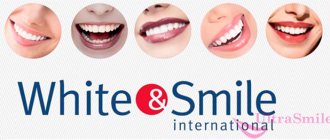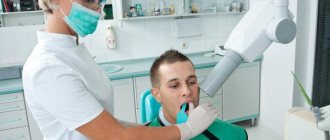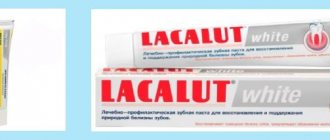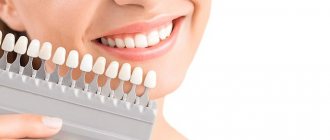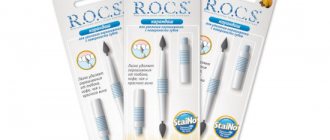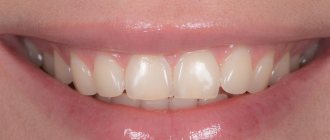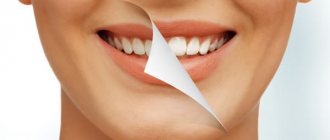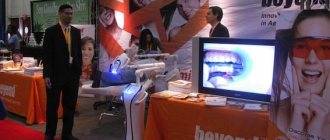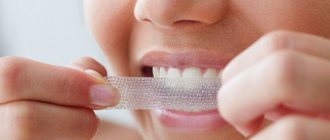One of the most popular services in cosmetic dentistry today is teeth whitening. In no way related to medicine, nevertheless, it is in great demand, because... in the minds of many of us, it is white (light) teeth that are an indicator of their health, as well as the high social status of their owner.
As I wrote earlier, such ideas were not always dogma, and how long such a fashion will last is unknown, but today it is so. I myself am neither a supporter nor an opponent of this procedure, and therefore I will try to talk about whitening as objectively and unbiasedly as possible. Moreover, I will do this in the form of questions and answers (i.e., a kind of FAQ on teeth whitening).
What is whitening and how does it differ from professional cleaning?
Very often patients say: “I want to whiten my teeth because... they have stains from coffee and cigarettes.” At the same time, they confuse 2 different procedures - teeth cleaning and teeth whitening. If brown plaque has accumulated on your teeth or stones have formed, then you need professional teeth cleaning, which is carried out with ultrasound, sandblasting (air-flow) or simply with a brush and a special professional abrasive paste. In this case, the dentist simply removes plaque from the surface of the teeth without changing their natural color. Although they become lighter, this is not bleaching. The whitening procedure involves the use of a strong oxidizing agent to lighten the actual tooth tissue. Hydrogen peroxide or carbamide peroxide, familiar to any unnatural blonde, is used as an oxidizing agent (it is approximately 2 times weaker than hydrogen peroxide). Penetrating into the internal structures of the tooth, the released active oxygen destroys the molecules of natural pigments, which leads to the fact that the tooth becomes lighter.
This is what plaque on teeth looks like, resulting from the abuse of cigarettes, coffee, and strong tea. It can be removed by professional cleaning, which has nothing to do with bleaching.
W&S brand oral care products
You can purchase such products in the network of beauty salons where you had cosmetic whitening, or via the Internet. All products are certified and suitable for daily oral care.
Dry mouthwash MINT BLAST
These are effervescent tablets designed to dissolve in the mouth. After being placed in the oral cavity, such a tablet dissolves without residue, helps remove soft plaque and bacteria, freshens breath, and normalizes the acid-base balance. One tablet contains xylitol and propolis, which effectively fight cariogenic bacteria. It also contains mint.
The mouthwash can be used after basic brushing with toothpaste and brush, as well as after any snack. The tablets are convenient to carry with you in your purse, to take to the country house, to the office, or on a trip.
Cost – from 400 rubles.
Effervescent tablets designed to dissolve in the mouth
Pearl Ice
This is a remedy that helps strengthen hard tissues and protects them from cariogenic bacteria. Contains xylitol, pearl substances, calcium. In appearance, the product resembles powder or powder, which must be applied to the enamel. Thanks to it, teeth become smooth and shiny, their surface is leveled, and microcracks are sealed. The product also has a slight cooling effect, which will help soothe sensitive gums.
Cost – from 800 rubles.
A product that helps strengthen hard tissues
Whitening powder W&S
The product contains soft abrasive particles, active oxygen and cocoa butter, and calcium hydroxyapatite nanoparticles. And also flavors to choose from: peppermint and watermelon, or pineapple and lemongrass. The powder helps remove age spots and soft plaque, brightens enamel, prevents the appearance of hard deposits, and freshens breath. Allantoin, which is part of the powder, promotes the regeneration of soft tissues of the oral cavity and partially relieves inflammatory processes in the mucous membrane. Calcium helps seal microcracks in the enamel and makes it stronger.
The product is suitable for daily use instead of regular paste. It is recommended to apply it to the brush 2 times a day - morning and evening, and brush your teeth according to the standard scheme, i.e. at least 2 minutes. However, you should not abuse it and use it for more than 2-3 weeks in a row.
Cost – from 700 rubles.
Powder helps remove age spots and soft plaque
Mousse W&S
This product is designed specifically for the care of sensitive teeth. It gently removes impurities and promotes remineralization of hard tissues. Mousse must be applied to the brush instead of regular paste. Due to its foaming consistency, it penetrates well into the most inaccessible areas and interdental spaces.
The product reduces enamel sensitivity and freshens breath, has a mint-lime aroma and taste.
Cost – from 500 rubles.
Care product for sensitive teeth
Instant Fresh mouthwash gel with hyaluron
Contains aloe juice and hyaluronic acid, which relieve inflammation of the gums, nourish soft tissues and promote their rapid regeneration. The gel is suitable for daily use after brushing your teeth; it creates a protective film on the surface of the enamel that prevents pathogenic microorganisms from “clinging” to the teeth. The product also helps prevent dry mouth.
Cost – from 300 rubles.
The gel is suitable for daily use after brushing your teeth.
Bamboo toothbrush
An eco-brush made of bamboo has medium-hard bristles and an antibacterial coating that prevents the proliferation of pathogens.
Eco-brush has antibacterial coating
Cost – from 200 rubles.
Want to know all the benefits of bamboo toothbrushes? Read on the topic: 5 advantages of a bamboo brush.
What types of whitening are there? Which whitening method is more effective?
If we talk about really effective whitening, then there are only two types. Office and home. I repeat once again that the essence is the same everywhere. What's the difference then? Office work, as you might guess, is carried out in the dentist’s office. It is produced by gels with a high concentration of bleaching agent (usually 35-38% hydrogen peroxide). You cannot do procedures with such concentrations yourself, because contact of the gel of such concentrations with the mucous membrane causes severe burns. The doctor uses numerous means of protection so that only the teeth are whitened, and not the tongue or lips. Some whitening systems (Zoom, LumaCool, etc.) involve activating the gel with a special lamp for a faster and more effective procedure. Some are simply applied to the teeth and work without any additional activation by light (Opalescence, Bleach n' Smile , etc.) In any case, the procedure takes about 1-1.5 hours and the result can be seen almost immediately. Especially in systems with light activation of the gel.
This photo shows the process of in-office whitening with the Opalescence XtraBoost system, which I prefer to use in my practice. The green arrows indicate the actual whitening gel (38% hydrogen peroxide), the blue arrows indicate the protective coating of the gums (the so-called “liquid dam”), the black arrows indicate a temporary plastic crown, which does not whiten and will be replaced with a permanent one after completing the whitening course.
Home whitening involves the patient performing the procedure independently at home. BUT! Under the supervision of a doctor exclusively! Ideally, you come to the doctor, in 1-2 days they make a special plastic individual mouthguard for your teeth, give you instructions on what gel, what concentration and according to what scheme is best to use in your case. And then at home you do everything exactly as the doctor ordered. Results can usually be seen within a couple of weeks. Exactly the same result as with the cabinet version.
The custom tray is filled with whitening gel and placed over the teeth. Mouthguard wearing patterns vary and must be selected individually by the dentist.
Let's summarize the pros and cons of teeth whitening options . In-office treatment is faster, but it is usually more expensive and is often associated with the appearance of unpleasant sensitivity, both during the procedure and for some time after it. Home whitening will give a similar result over a longer period, but it is cheaper and, as a rule, does not cause discomfort in the form of increased tooth sensitivity. In cases where the result is not required right now (unexpected wedding, urgent important date, etc.), it is better to choose home whitening. But if you are not confident in your accuracy, you don’t want to spend a long and tedious time remembering all the rules and following all the recommendations, prefer a less complicated office option.
If you suddenly have an important event in your life that you need to approach with a dazzling smile, then in-office whitening is your choice.
Using Zoom
Chemical teeth whitening, patient reviews can confirm this, using this system allows you to lighten the enamel by 8 tones. Dentists use “Urea Peroxide”, the advantages of which include:
- the drug does not have an aggressive effect on the enamel;
- copes well with plaque;
- the risk of complications during the procedure is minimal.
After determining together with the patient how much it is necessary to lighten the enamel, the procedure itself begins, consisting of the following steps:
- The oral mucosa, tongue, lips and cheeks are protected with a latex plate, and a reflective barrier is also placed to prevent tissue injury.
- Bleach-n-Smile gel is applied to the teeth.
- A beam from a light lamp is directed to activate the gel.
- The product is applied a second time.
- After some time, the result obtained is assessed and, if necessary, the application is repeated.
- The brightening gel is washed off with water.
- Tooth enamel is treated with a special compound to strengthen it.
Photos and reviews of teeth whitening immediately confirm the desired result.
Will my teeth have sensitivity after the whitening procedure?
I began to partially answer this question in the previous paragraph. In each case, the manifestation of hypersensitivity during and after the procedure cannot be predicted; everything is quite individual. Generally speaking, the appearance of increased sensitivity of bleached teeth to one degree or another manifests itself after any whitening method. The faster the procedure occurs, the higher the concentration of the whitening gel, the stronger and longer the discomfort. Therefore, according to the degree of severity of unpleasant sensations, we can rank the procedure options as follows: in-office with the use of activating lamps gives complications more often and the intensity of unpleasant sensations is higher, in-office without activating the gel with light - less, home - least often, up to complete absence. One way or another, there is no need to be afraid of this. Usually, however, the sensitivity is not very intense and lasts a maximum of a few days. In addition, there are special products to reduce tooth sensitivity that you can use during this period. In some whitening systems, they come complete with all consumables for the procedure, and are given to you by the doctor.
Contraindications
You should not resort to whitening with an LED lamp in the following cases:
- high sensitivity of teeth;
- defects on enamel;
- pregnancy or lactation (there are other methods);
- intolerance to the active components that make up the gel;
- fixed dentures, crowns or a large number of fillings;
- The procedure is also not recommended for children under 16 years of age;
- caries, periodontitis and other diseases.
In the latter case, the ban is temporary, since the procedure can be carried out after you have treated your teeth.
Is teeth whitening a harmful procedure?
As one medieval doctor said, “All poison is just a matter of dose.” The same can be said here. It is no secret that there is absolutely no benefit from bleaching in the medical sense. But there will be no harm from a competently carried out procedure. Suffice it to say that in the USA the bleaching procedure is very popular, and is generally equated to hair lightening, because... they even carry it out in shopping centers, not seeing any sedition in it. Therefore, if you really want to, bleach it. Only under the supervision of a doctor. In addition, the teeth on which the gel will be applied must be healthy, they should not have leaky fillings or caries. The dentist should check all this before you go into all serious troubles. He should also choose the best whitening method specifically for you and your teeth . Suggest the correct scheme for using products for home use, explain the features of dental care, etc. and so on. In general, conduct a full briefing and control. Only in this case the procedure will be as safe as possible and will bring nothing but a refreshed, white-toothed smile (if you are dreaming of it).
Teeth whitening looks so unpretentious and mundane in many shopping centers in the United States. While your wife is replenishing her wardrobe, and her beloved mother-in-law is replenishing her refrigerator, you can lie down and benefit your appearance.
Reviews
Below are some reviews. If you have something to say, leave your feedback in the comments below the article, it will be useful to our readers.
Good whitening is carried out without pain or discomfort for my sensitive teeth. After filling out a personal questionnaire and measuring the tone of the tooth enamel, sitting in a soft chair, a painless procedure takes place. Once in the evening after whitening, my teeth ached, but in the morning I didn’t feel it anymore.
Whitening in dentistry is more expensive, so when I came across this procedure, I was pleasantly surprised at the affordable price. The procedure is safe, delicate and comfortable, and most importantly, it does not damage the enamel.
How effective and harmful are whitening toothpastes?
Here it must be said that the vast majority of so-called whitening pastes are actually not capable of whitening anything, because... they simply lack an oxidizing agent. So this is a kind of advertising ploy by the manufacturers. But what they do have is a higher content of abrasive substances for more effective plaque removal. You should not use such toothpastes regularly; it can cause serious harm to your teeth. At a minimum, this may threaten the appearance of increased sensitivity of teeth , and at a maximum, the appearance of non-carious lesions (mainly wedge-shaped defects). They can be used only temporarily (no more than one medium tube is used up) and it is advisable to alternate it with regular toothpaste. It is needed primarily by heavy smokers and coffee lovers. If you are not one of them, then you should not turn your attention to “whitening” toothpastes. In some rare cases, whitening toothpastes do contain small amounts of a bleaching agent. And such a paste really has the right to be called “whitening.” They are sold more often in pharmacies and are much more expensive than regular pastes. But even with regular use, you should not count on a noticeable effect from their isolated use. Concentrations are too low. As a rule, they are used for the period while the home whitening process is in progress to enhance and maintain the effect.
Here you can also talk about other “pharmacy” products for teeth whitening – various varnishes, strips, etc. All of these are very ineffective drugs for the same reason - a low concentration of the bleaching agent. To feel the results from them, you need to have a very high power of self-hypnosis. So it's just wasted money.
Comments
I have been visiting this studio every 4 months for 3 years now. The enamel is fine, there is no sensitivity. They also have a super cool pineapple powder.
Anna (01/19/2020 at 08:46 pm) Reply to comment
I have fluorosis, will White and Smile help me somehow improve the situation?
Marina (02/03/2020 at 16:31) Reply to comment
- Dear Marina! This technique will not help solve the problem of fluorosis, nor will it cope with other non-carious lesions of the enamel. You need to see a dentist; depending on the complexity of the disease, doctors can solve the problem in different ways: professional whitening methods (for example, for mild fluorosis, ZOOM can give an effect), strengthening the enamel using fluoridation and remineralization, installing veneers, lumineers or crowns.
Editorial staff of the portal UltraSmile.ru (02/06/2020 at 09:22) Reply to comment
Write your comment Cancel reply
What effective folk whitening remedies exist? How to whiten teeth at home?
This question could be answered briefly: there are no effective traditional methods of teeth whitening . And I would like to warn against the thoughtless use of improvised means in order to save money. Very often this backfires. It is strictly forbidden to use soda, tooth powders, lemon, activated carbon, etc. to brighten your smile. in different combinations. I personally once had a patient who spent a considerable amount of time brushing her teeth with a mixture of baking soda and lemon juice. When she came to me, I learned for the first time what enamel erosion looks like. At that time I had not yet photographed clinical cases, but it looked something like this.
How do you like this “whitening”? Instead of beautiful teeth, they were irreparably damaged and their restoration cost her a lot of money. As usually happens, thoughtless savings turned into even greater expenses.
I also heard a story from colleagues about how one of the patients whitened his teeth with “Toilet Duck”, because the bottle said “safe for enamel.” Well, what else can you say?
to whiten your teeth on your own online . Most of them are just a waste of time. And some are simply harmful. So, in pursuit of beauty, do not lose your sanity, otherwise you risk losing your teeth. Ultimately, if you need to post your photo on a social network or forum, you can whiten your teeth using Photoshop (as they do in glossy magazines for unnaturally white-toothed models). Or if you need white teeth for some important occasion, you can visit the solarium several times, use a foundation of a darker shade... against the background of dark skin, the teeth will appear lighter even without any bleaching (just look at the “tanned” Africans, whose teeth are always appear dazzlingly white just because of the color of their skin).
Is it possible to whiten a dead, darkened tooth?
Yes, and this procedure is called endobleaching . Those. internal tooth whitening. It may be needed when, after removing a nerve in a tooth, for various reasons it becomes dark, turns yellow and begins to stand out from its healthy neighbors. In this case, access to the canal is made in the tooth, it is reliably isolated, and the same hydrogen peroxide/urea whitening gel remains in the cavity for 2-3 days. As a result, the darkening of the dead tooth can be eliminated. Often this procedure must be performed before prosthetics of the front teeth with metal-free crowns or veneers. Due to their fairly high transparency (which is very necessary from an aesthetic point of view), any change in the color of the tooth underneath will be unpleasant to show through. This may prevent you from making restorations of the same color.
Upper central incisor darkened after depulpation
The same after the internal bleaching procedure
What is restorative bleaching? Is it possible to whiten teeth with veneers?
Restorative bleaching is, in most cases, a great stupidity that some doctors suggest that their patients do to themselves. This procedure involves covering the front surface of the teeth with a thin layer of white opaque composite material (it was popular in the past), or the same white opaque ceramic veneers/lumineers. In both cases, an irreversible change in the surface of a healthy tooth is assumed. In the case of a composite, you get a very dubious option from the point of view of aesthetics and service life. Well, about all kinds of “ veneers without grinding teeth/lumineers/ultraneers , etc.” you can read it here. In what cases can this option be used? There is only one good indication here – serious generalized (i.e. on all teeth at once) changes in their color. Such problems may be associated with impaired development of tooth buds in childhood or even in the womb. The most common of these pathologies are the so-called. tetracycline teeth.
This is what one of the unpleasant lesions of teeth looks like during their development, the so-called. "tetracycline teeth"
You can also resort to total restoration of all visible teeth if you desperately need teeth the color of plumbing fixtures - absolutely white. It will never be possible to whiten healthy, normal teeth to such a state using any method, and attempts to do so can still end disastrously for the teeth. So if you are a movie and TV star, and your mouth is periodically shown in close-up on the entire screen throughout the country, and the size of your future fees depends on the degree of whiteness of your teeth, then restorative bleaching is quite an option for you... After all, against the background of circular braces , liposuction, enlargement/reduction of everything that can be enlarged/reduced, total teeth veneering looks like a completely innocent and absolutely safe children’s prank.
How to care for whitened teeth?
Immediately after the whitening procedure, for 2-3 days it is better to refrain from coloring products - wine, berry jam, strong tea (especially cheap... from bags in which nothing but paint is poured, not even tea leaves), coffee, smoking (if possible ) and so on. If increased sensitivity occurs after the procedure, you can use a special paste for sensitive teeth (Lacalute Sensitive, Sensodyne) or ask your dentist for a special gel to reduce sensitivity, which often comes in the same set with a whitening gel. In the future, no specific care for whitened teeth is required. Over time, their natural color will be restored. In this case, you can conduct a short maintenance course of home whitening, after consulting with your dentist. Typically, such a need arises no more often than every 6 months to 1 year.
What is laser whitening? Is it true that it is the most effective?
Laser whitening/photo whitening (I came across other names) - all of this is essentially the same thing. In order to stand out from the crowd and offer patients something “unique... and only here,” clinic advertisers come up with a bunch of names for the same procedure. All this is standard whitening with gels, which are activated by the light of special lamps. Indeed, such systems (Zoom, LumaCool, LumaArch and many others) give the fastest and most noticeable results. But at the same time they also give the greatest number of cases of the development of very intense hypersensitivity. Plus, due to the rather high cost of consumables required for each procedure, the high cost of the lamp itself, which must be “beaten”, the price for such a service turns out to be the highest of all possible options for whitening procedures. But the choice is ultimately yours. Do you want instant results visible to the naked eye? Pay with money and discomfort from pain. Do you want it cheaper and with a minimum of discomfort? Then be patient and forget about “laser” whitening.
The generation of advertisers who grew up watching Star Wars apparently imagines the dentists of the future in this way, luring patients to clinics for “laser treatment of caries,” “laser whitening,” and “laser implantation.”
In fact, this is what the Zoom lamp for “laser” (i.e., actually conventional, light-activated) whitening looks like these days.
Are artificial crowns and fillings bleached?
No. No crowns or fillings can be whitened using any method. Therefore, after lightening your teeth, you will have to replace any restorations with those that are visible when you smile and talk. If your teeth have caries or leaky fillings, then before whitening a temporary restoration is made, which, after all lightening procedures are completed, is changed to a permanent one, taking into account the resulting shade of the teeth.
This photo shows that the plastic temporary crown, originally made to match the color of the neighboring teeth, after the whitening procedure stands out strongly against the background of its lighter neighbors
These are the main questions about teeth whitening that I have encountered. This article will be updated as new ones appear. If you are thinking about this fashionable procedure, remember that beautiful teeth are, first of all, healthy teeth. And in attempts to improve their appearance, you should not harm them with dubious methods or independent exercises using improvised means.
Information about the company White&Smile
White&Smile International is the brainchild of two European companies, namely White and Smile (France) and InSmile (Italy). This conglomerate is famous in the world for the production of products and cosmetic solutions for express teeth whitening. The company appeared in Russia in 2013 and now opens studios here every month under its brand through the sale of a franchise - currently there are 200 W&S salons in Russia, providing cosmetic, rather than dental, enamel lightening services.
In fact, official importers of exclusive products work on behalf of the company in Russia, who guarantee quality from European manufacturers and quick results, namely, teeth lightening by 2-12 shades in a very short period of time (from 15 to 45 minutes). The company's representative office in Russia claims that among similar products, only this product is approved by the specialized research institute of the Ministry of Health of the Russian Federation1.
The company appeared in Russia in 2013
In 2022 and 2022, W&S was included in the TOP 25 most profitable franchises according to Forbes magazine. In 2022, the brand was recognized as an industry leader, and in 2022 it was included in the list of one hundred best enterprises and organizations in Russia. All this is good for those who provide the service. However, consumers or patients are more interested in quality, cost, effectiveness and safety. We propose to talk about this further.
